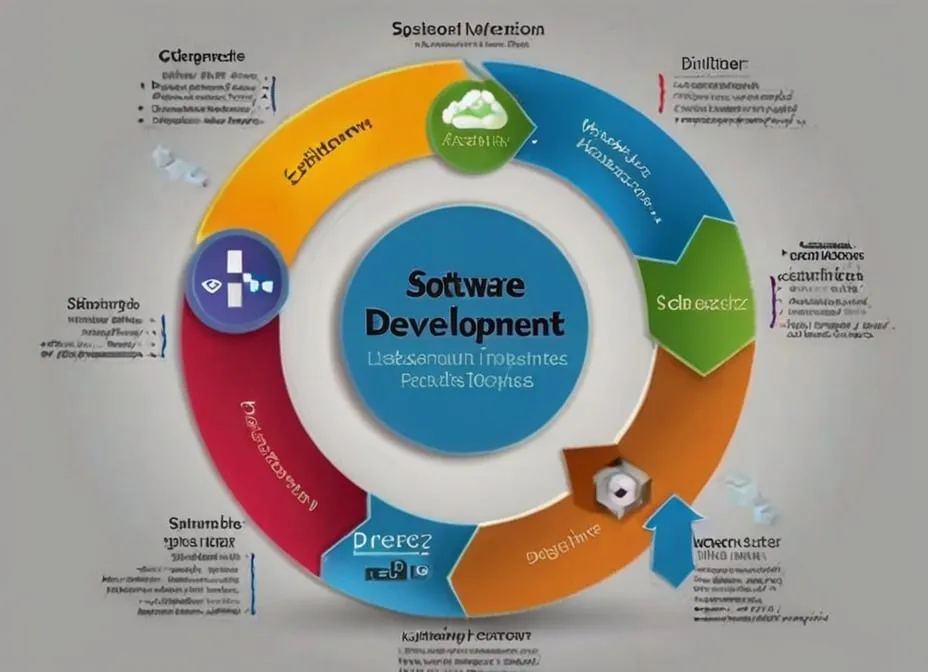IT Careers List: Opportunities in Software, Data, and More
1. Introduction to IT Careers
1.1 The Importance of IT in Today's World
In our rapidly evolving digital age, information technology (IT) has become the backbone of modern society. From the smartphones in our pockets to the complex systems that power global enterprises, IT plays a crucial role in virtually every aspect of our lives. As technology continues to advance at an unprecedented pace, the demand for skilled IT professionals has skyrocketed, making it an exciting and lucrative career path to explore.
1.2 The Diverse Range of IT Careers
The world of IT encompasses a wide array of specialties, each offering unique challenges and opportunities. Whether you're a creative problem-solver, an analytical thinker, or a strategic visionary, there's an IT career that aligns with your interests and talents. From coding and software development to network administration, cybersecurity, and data analytics, the possibilities are truly endless.
1.3 The Benefits of an IT Career
Pursuing a career in IT can be incredibly rewarding, both personally and professionally. Not only do IT professionals enjoy competitive salaries and job security, but they also have the opportunity to work on cutting-edge technologies that shape the future. Additionally, many IT careers offer the flexibility to work remotely or in a hybrid environment, providing a better work-life balance.
1.4 Debunking Common Myths about IT Careers
Despite the growing demand for IT professionals, there are still many misconceptions surrounding these careers. Some people mistakenly believe that IT jobs are boring, sedentary, or solely focused on coding. However, the reality is quite different. IT careers are dynamic, and collaborative, and often involve problem-solving, creativity, and constant learning.
2. Software Development and Programming Careers

2.1 Web Developer
Web developers are the masterminds behind the websites and web applications that we use every day. They are responsible for designing, building, and maintaining these digital platforms, ensuring a seamless and user-friendly experience. Whether you're interested in front-end development (creating the visual interface) or back-end development (managing the server-side logic), a career as a web developer offers endless opportunities for creativity and innovation.
Skills and Responsibilities:
- Proficiency in programming languages such as HTML, CSS, JavaScript, and frameworks like React, Angular, or Vue.js
- Understanding of web development principles, including responsive design, cross-browser compatibility, and web accessibility
- Ability to collaborate with designers, project managers, and other developers
- Knowledge of server-side scripting languages (e.g., PHP, Python, Ruby) for back-end development
- Familiarity with version control systems and deployment processes
2.2 Mobile App Developer
As smartphones and tablets continue to dominate our digital lives, the demand for skilled mobile app developers has skyrocketed. These professionals are responsible for designing, developing, and maintaining mobile applications for various platforms, such as iOS (Apple) and Android. With the rise of wearable technology and the Internet of Things (IoT), the opportunities in this field are boundless.
Skills and Responsibilities:
- Proficiency in programming languages like Swift (for iOS), Java, or Kotlin (for Android), and cross-platform frameworks like React Native or Flutter
- Understanding of mobile app design principles, user experience (UX), and user interface (UI) guidelines
- Knowledge of app distribution processes and app store requirements
- Familiarity with mobile device hardware, sensors, and APIs
- Ability to optimize app performance, battery life, and security
2.3 Software Engineer
Software engineers are the architects and builders of complex software systems, ranging from operating systems and databases to enterprise applications and video games. They are responsible for designing, developing, testing, and maintaining these software solutions, ensuring they meet the specified requirements and function efficiently.
Skills and Responsibilities:
- Expertise in programming languages like Java, C++, Python, or C#
- Understanding of software development methodologies (e.g., Agile, Waterfall)
- Knowledge of software design patterns, algorithms, and data structures
- Ability to write clean, maintainable, and scalable code
- Familiarity with version control systems, continuous integration/continuous deployment (CI/CD), and software testing practices
2.4 Computer Programmer
Computer programmers are the masterminds behind the code that powers our digital world. They are responsible for translating software designs and specifications into functional code, ensuring that programs and applications run smoothly and efficiently. While the role of a computer programmer may overlap with that of a software engineer, programmers often specialize in specific programming languages or domains.
Skills and Responsibilities:
- Proficiency in one or more programming languages (e.g., Java, C++, Python, Ruby, SQL)
- Understanding of programming concepts, algorithms, and data structures
- Ability to write clean, efficient, and well-documented code
- Knowledge of debugging techniques and software testing methodologies
- Familiarity with version control systems and collaboration tools
3. Networking and Infrastructure Careers
3.1 Network Administrator
Network administrators are the backbone of an organization's IT infrastructure. They are responsible for designing, implementing, and maintaining computer networks, ensuring that data can flow seamlessly and securely across various systems and devices. From setting up routers and switches to configuring firewalls and monitoring network performance, network administrators play a crucial role in keeping businesses connected and operational.
Skills and Responsibilities:
- Understanding of networking protocols, technologies, and security principles
- Knowledge of network hardware (e.g., routers, switches, firewalls)
- Ability to configure and troubleshoot network devices and services
- Familiarity with network monitoring and performance optimization tools
- Strong problem-solving and analytical skills
3.2 Systems Administrator
Systems administrators are the guardians of an organization's computer systems and servers. They are responsible for ensuring that these critical systems run smoothly, efficiently, and securely. From installing and configuring operating systems and software to managing user accounts, monitoring system performance, and implementing backup and recovery strategies, systems administrators play a vital role in maintaining the IT infrastructure.
Skills and Responsibilities:
- Expertise in operating systems (e.g., Windows, Linux, macOS)
- Knowledge of server hardware, virtualization technologies, and storage solutions
- Ability to automate system administration tasks and scripting
- Familiarity with security best practices, patching, and vulnerability management
- Strong troubleshooting and documentation skills
3.3 Cloud Architect
As more organizations embrace cloud computing, the demand for skilled cloud architects has soared. These professionals are responsible for designing, planning, and implementing cloud computing solutions that meet an organization's specific requirements.
From selecting the appropriate cloud service providers (e.g., Amazon Web Services, Microsoft Azure, Google Cloud Platform) to migrating existing applications to the cloud and ensuring seamless integration, cloud architects play a pivotal role in an organization's digital transformation.
Skills and Responsibilities:
- In-depth understanding of cloud computing technologies and architectures
- Knowledge of cloud service providers and their offerings
- Ability to design and implement secure, scalable, and cost-effective cloud solutions
- Familiarity with cloud automation, monitoring, and governance tools
- Strong problem-solving and analytical skills
3.4 Cybersecurity Specialist
In today's digital landscape, where cyber threats are ever-present, cybersecurity specialists play a vital role in safeguarding an organization's digital assets and protecting against data breaches, malware, and other cyber attacks. These professionals are responsible for implementing and maintaining security measures, conducting risk assessments, and responding to security incidents.
Skills and Responsibilities:
- Knowledge of cybersecurity principles, techniques, and best practices
- Understanding of security technologies (e.g., firewalls, intrusion detection/prevention systems, encryption)
- Ability to perform vulnerability assessments and penetration testing
- Familiarity with incident response and forensic analysis
- Strong analytical and problem-solving skills
4. Data and Analytics Careers

4.1 Data Analyst
Data analysts are the unsung heroes of the data-driven world. They are responsible for collecting, organizing, and analyzing data to uncover valuable insights and trends that can inform business decisions. From creating reports and visualizations to identifying patterns and anomalies, data analysts play a crucial role in helping organizations make data-driven decisions.
Skills and Responsibilities:
- Proficiency in data analysis tools and programming languages (e.g., SQL, Python, R, Excel)
- Understanding of statistical concepts and data mining techniques
- Ability to clean, transform, and model data
- Knowledge of data visualization tools and techniques
- Strong analytical and problem-solving skills
4.2 Data Scientist
Data scientists are the true explorers of the digital age, combining expertise in statistics, computer science, and domain knowledge to extract valuable insights from vast amounts of data. They are responsible for developing and applying advanced algorithms and machine learning models to solve complex business problems and drive innovation.
Skills and Responsibilities:
- Expertise in programming languages (e.g., Python, R, Java)
- Knowledge of machine learning algorithms and techniques
- Understanding of statistical modeling and data mining
- Ability to communicate complex data insights to non-technical stakeholders
- Strong analytical and problem-solving skills
4.3 Business Intelligence Analyst
Business intelligence (BI) analysts are the bridge between data and business strategy. They are responsible for collecting, analyzing, and interpreting data to uncover insights that can help organizations make informed decisions and gain a competitive advantage. From identifying market trends and customer behavior patterns to optimizing business processes and performance, BI analysts play a crucial role in driving data-driven decision-making.
Skills and Responsibilities:
- Proficiency in BI tools and technologies (e.g., Power BI, Tableau, QlikView)
- Understanding of data warehousing and ETL (extract, transform, load) processes
- Ability to create compelling data visualizations and dashboards
- Knowledge of data modeling and reporting techniques
- Strong analytical and communication skills
4.4 Database Administrator
Database administrators (DBAs) are the guardians of an organization's data, responsible for ensuring the integrity, security, and performance of database systems. They play a critical role in designing, implementing, and maintaining databases, as well as optimizing database performance, managing backups and recovery, and ensuring data accessibility and security.
Skills and Responsibilities:
- Expertise in database management systems (e.g., SQL Server, Oracle, MySQL)
- Knowledge of database design principles and data modeling
- Ability to write complex SQL queries and stored procedures
- Familiarity with backup and recovery strategies, database security, and performance tuning
- Strong problem-solving and analytical skills
5. IT Project Management and Business Roles

5.1 IT Project Manager
IT project managers are the orchestrators of technology initiatives, responsible for planning, executing, and overseeing the successful delivery of IT projects. They play a crucial role in defining project scope, managing resources, mitigating risks, and ensuring that projects are completed on time, within budget, and in alignment with organizational objectives.
Skills and Responsibilities:
- Knowledge of project management methodologies (e.g., Agile, Waterfall)
- Ability to develop project plans, schedules, and budgets
- Strong communication and stakeholder management skills
- Familiarity with risk management and change control processes
- Understanding of IT technologies and business requirements
5.2 IT Business Analyst
IT business analysts are the bridge between an organization's business needs and its IT capabilities. They are responsible for analyzing business processes, identifying areas for improvement, and translating these requirements into technical specifications for IT solutions. By collaborating closely with stakeholders across different departments, IT business analysts play a crucial role in aligning technology initiatives with business objectives.
Skills and Responsibilities:
- Understanding of business processes and requirements-gathering techniques
- Ability to analyze data and identify process inefficiencies
- Knowledge of modeling tools and techniques (e.g., UML, BPMN)
- Strong communication and documentation skills
- Familiarity with IT technologies and industry best practices
5.3 IT Consultant
IT consultants are the problem-solvers and advisors of the tech world. They work with organizations to assess their IT needs, identify areas for improvement, and provide expert guidance on technology solutions. From recommending hardware and software to optimizing processes and implementing new systems, IT consultants play a vital role in helping businesses leverage technology to achieve their goals.
Skills and Responsibilities:
- Expertise in various IT domains (e.g., networking, security, cloud computing)
- Knowledge of industry best practices and emerging technologies
- Ability to assess organizational needs and provide strategic recommendations
- Strong communication and presentation skills
- Familiarity with project management and change management principles
5.4 Chief Information Officer (CIO)
The Chief Information Officer (CIO) is the highest-ranking IT executive in an organization, responsible for overseeing and aligning the company's technology strategy with its overall business objectives. As a member of the executive leadership team, the CIO plays a crucial role in driving digital transformation, fostering innovation, and ensuring that technology investments deliver value and competitive advantage.
Skills and Responsibilities:
- Strategic vision and leadership abilities
- In-depth understanding of IT technologies and their business implications
- Knowledge of IT governance, risk management, and compliance
- Ability to communicate effectively with executives and stakeholders
- Strong decision-making and problem-solving skills
Other IT Careers That Are Worth Considering
Other IT careers are worth considering beyond the list provided. Here are some additional IT career options:
- User Experience (UX) Designer UX designers focus on creating intuitive and user-friendly digital products, applications, and websites. They conduct user research, design prototypes, and ensure that the user interface (UI) is easy to navigate and provides a seamless experience.
- Information Security Analyst Information security analysts are responsible for protecting an organization's computer systems and networks from cyber threats. They identify vulnerabilities, implement security measures, and develop strategies to prevent and respond to security breaches.
- Computer Systems Analyst Computer systems analysts study an organization's current computer systems and procedures and design solutions to help the organization operate more efficiently and effectively. They bring together business and information technology to improve processes and productivity.
- Computer Hardware Engineer Computer hardware engineers research, design, develop, and test computer components and systems such as processors, circuits, memory devices, networks, and other hardware.
- Computer Network Architect Computer network architects design and build data communication networks, including local area networks (LANs), wide area networks (WANs), and Internet systems. They ensure that these networks can efficiently handle data traffic and are secure.
- IT Support Specialist IT support specialists provide technical assistance and support to organizations or individual users. They troubleshoot hardware, software, and network issues, and guide users in resolving technical problems.
- Video Game Designer/Developer Video game designers and developers create and develop computer and video games. They design game storylines, characters, and environments, as well as write code and integrate multimedia elements.
- Computer Forensics Investigator Computer forensics investigators use specialized techniques and tools to recover and analyze data from various digital devices. They play a crucial role in investigating cybercrimes and gathering digital evidence for legal proceedings.
- Health Information Technician Health information technicians are responsible for managing and organizing patient health data and medical records. They ensure the accuracy, completeness, and security of electronic health records (EHRs) and other healthcare data.
- IT Trainer/Instructor IT trainers and instructors develop and deliver training programs to help individuals or organizations learn new software, applications, or IT systems. They create course materials, conduct training sessions, and assess learner progress.
These are just a few examples of additional IT careers to consider. The field of information technology is vast and diverse, offering a wide range of opportunities for professionals with various interests and skill sets.
FAQs
- What is the most in-demand IT career? The most in-demand IT career can vary depending on the industry and the specific needs of organizations. However, some of the most sought-after roles include cybersecurity specialists, data scientists, cloud architects, and software developers, particularly those specializing in emerging technologies like artificial intelligence, machine learning, and the Internet of Things (IoT).
- Do I need a degree to pursue an IT career? While a formal degree in computer science, information technology, or a related field can be beneficial, it is not always a strict requirement for many IT careers. Many employers value practical skills, certifications, and relevant experience. However, some specialized roles, such as software engineering or data science, may require a bachelor's or even a master's degree.
- How can I stay up-to-date with the latest IT trends and technologies? The IT industry is constantly evolving, and it's crucial to stay up-to-date with the latest trends and technologies. Some ways to do this include attending industry conferences and events, participating in online communities and forums, taking online courses or certifications, reading industry publications and blogs, and networking with other IT professionals.
- What are the most important skills for IT professionals? While specific technical skills are essential for various IT roles, some of the most important skills that cut across all IT careers include problem-solving abilities, analytical thinking, attention to detail, effective communication, collaboration, and a willingness to learn and adapt to new technologies.
- Can I work remotely in an IT career? Yes, many IT careers offer the possibility of remote work or a hybrid work arrangement. With the rise of cloud computing, virtualization, and collaboration tools, IT professionals can often perform their duties from anywhere with a reliable internet connection. However, the extent of remote work opportunities may vary depending on the specific role and the organization's











